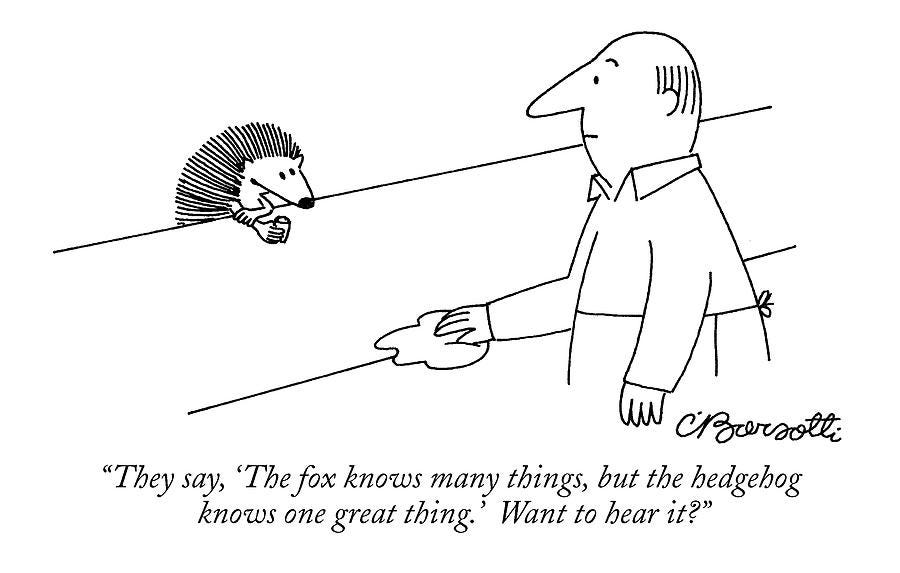“The fox knows many things, but the hedgehog knows one important [μέγα] thing.” —Archilochus1
“A group of Epicurean and Stoic philosophers [φιλοσόφων] began to debate with him. Some of them asked, ‘What is this babbler [σπερμολόγος] trying to say?’” (Acts 17:18)
Fledgling academics are advised (or, more accurately, warned) by their elders to specialize, specialize, specialize. “If you want to be taken as a serious scholar, you’ve got to plant your flag in a very specific region of the continent of knowledge. Settle in it, make it your home, concentrate on becoming an expert cartographer of its terrain, and stay strictly within its borders.” Don’t scattergun; focus on one important thing.
During my 30+ years in the academy I was always amazed at how many of my colleagues took this advice to heart. With dogged determination they pursued single research agendas throughout their entire scholarly careers. I remember one, for example, who focused exclusively on mapping the parts of the brain that light up when subjects are exposed to music; another single-mindedly devoted herself to Ovid’s Ars Amatoria; this one specialized in the poetry of Rupert Brooke and that one in the reproductive cycle of newts; one of my own professors knew everything there was to know about J.L. Austin but boasted (quite believably) that he’d never read a word of Plato’s or Kant’s; and so on. Early in my academic career, a colleague in the biology department identified himself as an old-fashioned “naturalist.” Alas. His hyperspecialized associates saw him as a lovably quaint throwback utterly out of step with the discipline.
Gone for the most part are the days when being a “dilettante,” an intellectual hummingbird never content to sup at only one flower, was a perfectly respectable thing to be.2 In fact, dilettantism is now a pejorative catchword designating lack of commitment to one’s discipline, an unwillingness to do the hard work of digging in, or an absence of intellectual grit. Specialization is for experts, flitting around the garden for dilettantes.
Foxes and Hedgehogs
Inspired by a line from the 7th-century BC poet Archilochus about foxes and hedgehogs, Isaiah Berlin famously captured the temperamental difference between people drawn to specialization and those who aren’t.
Hedgehogs, says Berlin, dig in. They “relate everything to a single central vision, one system, less or more coherent or articulate, in terms of which they understand, think and feel—a single, universal, organising principle in terms of which alone all that they are and say has significance.” Foxes, on the other hand, roam around. They “pursue many ends, often unrelated and even contradictory, connected, if at all, only in some de facto way.” Their intellectual and artistic lives are “centrifugal rather than centripetal; their thought is scattered or diffused, moving on many levels, seizing upon the essence of a vast variety of experiences and objects for what they are in themselves.”3
Berlin made no value judgment about the respective merits of these two styles. He believed that each is fruitful. Rambling foxes, intensely curious about everything, are encyclopedic compilers. Steady hedgehogs, focused with laser-like precision on a single important topic within a very specific framework, concentrate on concise analysis. Both are important.
But unlike Berlin, the academy does make a value judgment. “Hedgehog” is a term of praise, “fox” a pejorative. Better to be hedgehogs, young academics are cautioned, than foxes. Be serious scholars instead of hummingbirds (to mix faunic metaphors) who flit hither and yon. Hedgehogs keep their eyes on the prize and get things done; foxes are flibbertigibbets who run around but never actually get anywhere.
Philosophers and Seed-pickers
These days, being thought of as a fox, at least in academic circles, is bad enough. But twenty-one centuries ago, an even more derogatory term was “seed-picker.”
According to the Acts of the Apostles,4 Paul of Tarsus traveled to Greece on his second missionary trip and spent some time in Athens, which even in his day, a good four centuries after the golden age of Socrates, Plato, and Aristotle, enjoyed a reputation as a city of learning. Never one to hide his light under a basket, Paul seized the opportunity to evangelize the city’s Epicurean and Stoic philosophers (φιλοσόφων), hedgehoggily academic “lovers of wisdom.” They listened to his spiel until he mentioned the Resurrection, at which point they lost patience and dismissed him as a foxy “babbler” (σπερμολόγος) who ruined his discourse by chasing too many rabbits.
Poets may write approvingly of babbling brooks, but generally the word, associated as it is with the Babel myth, has a negative connotation. To babble is to speak idly, disjointedly, or nonsensically. Toddlers, drunkards, and idiots babble. So do sloppy thinkers who leap from one subject to another, gullible ones who incautiously swallow and then spout outrageous whoppers, or uncritical ones who cram together too many disparate interests. Paul, the philosophon concluded, was all three.
“Babbler”5 is insult enough; but other English translations of Acts, striving to capture the term’s opprobrium, lay it on even thicker: “foolish babbler,”6 “idle babbler,”7 “charlatan,”8 “parrot,”9 “airhead,”10 “huckster,”11 “vagabond,”12 “ignorant showoff,”13 “pseudo-intellectual,”14 “seed-picking ditherer,”15 and “picker up of seeds.”16
Wow.
The last two translations come closest to the original Greek spermologos, which appears but once in the entire Bible (Acts 17:18). When used neutrally, it can refer to a seed-pecking bird. But as a pejorative, it designates someone who picks up scraps or seeds of knowledge willy-nilly, here, there, and everywhere, but then doesn’t quite know what to do with them. Because the spermologos, unlike the learned philosophos, fails to concentrate the mind on a single topic, he or she comes across as an ignorant babbler, a poser who pretends to be an intellectual, a contemptible ditherer.
The Virtue of Babbling
Like Berlin, I find merit in both camps. It’s good that some people are hedgehogs, mulling over a single subject with focused intensity, turning it this way and that to discover everything there is to know about it. Hats off to them all.
But it’s also good that others—the foxes, the seed-pickers, the hummingbirds—are entranced by so many areas of inquiry that they simply can’t bear the thought of ignoring any of them. Breadth doesn’t necessarily mean an absence of focus or a lack of depth.
I suspect Berlin, well familiar with the academy’s valuation of specialization, realized that his distinction between foxes and hedgehogs could be wielded as praise for the one at the expense of the other. So as a safeguard, he wisely warned against seeing it as dogma: “like all over-simple classifications of this type, the dichotomy becomes, if pressed, artificial, scholastic and ultimately absurd.”17
I want to take him at his word. Although I think that his classification of intellectual temperament embodies, as he says, some “degree of truth,”18 I also believe that his fox and the Athenian philosophers’ babbler are more valuable than he or they acknowledge.
I should admit up front that I have a dog in this fight. Anyone who bothers to scan the titles of my books and articles will easily and accurately conclude that I’m a fox, a hummingbird, a seed-picker.19 I’ve always bristled at being referred to as a “scholar” because my interests and writing have never been confined, in acceptable “scholarly” fashion, to a single “research agenda.” I’ve always traveled more widely than that. So in my defense of babblers, let me use myself as a case study. I’m confident that I speak for most of us.
My intellectual rambling isn’t because I get bored so easily that I have to be constantly on the move. Instead, the world in all its complexity so fascinates me that I can’t help wanting to taste as much of it as I can before the night closes in. I want to read all its books, see all its art, hear the song of all its birds, exult in the silence of all its snowfalls, explore all its terrifying heights as well as its calming plains. My foxiness isn’t motivated by mere curiosity. It’s a product of sheer delight and wonder. There’s so much to discover. Why would I want to confine myself to one specialized field of inquiry, important though it may be?
I’m reminded here of a lovely passage from Marx’s otherwise unreadable The German Ideology in which he imagines a society liberated from a hard-and-fast division—that is, specialization—of labor. In such a state, it would be “possible for me to do one thing today and another tomorrow, to hunt in the morning, fish in the afternoon, rear cattle in the evening, criticize after dinner, just as I have a mind, without ever becoming hunter, fisherman, herdsman or critic.”20 Exactly. That’s the fox’s ideal.
Granted: foxiness can be symptomatic of a jaded intellectual Don Juanism. But what prevents that in most cases is a quality that Archilochus, the Athenian philosophers, and Berlin overlooked (and here’s where I follow Berlin’s counsel against taking his dichotomy too literally): the fox’s hunger to discern hints of the common thread that weaves through everything and ties them together.
In my own case, I’ve delighted in any number of seemingly disparate interests partly for their own sakes, but also because I wanted to discover what light each of them could shed on one another and everything else. And true enough: the more I explored—the more seeds I picked up and examined—the more organic connections were revealed to me. For example, the ethics of diet, intrinsically interesting, linked to the broader issue of nonviolence, which then meshed with the dynamics of American slavery, which in turn connected to the relationship between Christianity and culture, which of course intertwined with metaphysical questions about the existence of God. All of these areas related to one another, not because I contrived connections between them but because they objectively intertwine in the vast nexus we abstractly call reality. Our webs of belief mirror the web of creation.
Following where all these inquiries lead me—the hummingbird flitting from flower to flower—brings me closer and closer to an appreciation of the Big Picture that I never would’ve had by hedgehogging it. Of course, neither I nor any other fox will ever reach the end of our explorations. The world’s expansiveness will always prove too much for us. But specialization’s purview will always be much less. In evolutionary terms, specialization is a narrowing that inevitably increases the chance of extinction.
So there’s a bit of the hedgehog and the Athenian philosopher in foxes. We babblers too are looking for one important thing—actually, the One Important Thing. It’s just that we search for it by expanding rather than contracting our perspectives. Hedgehogs will discover in their specialized inquiries bits and pieces of information about the world that are invaluable. There’s absolutely no doubt about that. But it takes a fox, a seed-picker, a babbler, a hummingbird to suss out how they connect with everything else.
###
Archilochus, Fragment 201, quoted in Isaiah Berlin, The Hedgehog and the Fox: An Essay on Tolstoy’s View of History (London: Weidenfeld & Nicolson, 2022), p. 1.
In the Enlightenment, the French philosophes gladly thought of themselves as dilettantes, so curious about so many things that they never dreamt of limiting the scope of their investigations. The very title of their 28-volume Encyclopédie, Ou Dictionnaire Raisonné Des Sciences, Des Arts Et Des Métiers, proclaims the breadth of their interests.
Berlin, p. 2.
Acts 17:16-33.
King James, Revised Standard Version, New Revised Standard Version, New American Bible Revised, New Oxford, Challoner-Rheims.
New English Translation.
New American Standard Bible.
New English Bible.
Jerusalem and New Jerusalem Bible.
The Messenger Bible (Peterson translation).
Cotton Patch Bible (Jordan translation).
New Testament (Lattimore translation).
Great News for Modern Man Bible.
Holman Standard Christian Bible.
New Testament (Hart translation).
Orthodox Bible.
Berlin, p. 2.
Ibid., p. 3.
And not for nothing, I’d say that Berlin is himself pretty much of a fox.
Karl Marx, The German Ideology, no translator cited (Amherst, NY: Prometheus Books, 1998), p. 54.











As a utopian, Marx doubtless dreamt thoughts too great for men. For example, if we literally abandoned a division of labor within the social collective, who would be held accountable for the ensuing mediocrity of the tradesmen, the professions, the rulers, or warriors?
And yet, given Marx’s system-building imagination, I submit that he was neither hedgehog nor fox. (I agree that Berlin, who I also admire, was basically foxy). In contrast, Marx was a forceful, vicious intellectual lion. A creature wedded to no particular terrain other than his own.
At bottom, Marx transcended both categories: that’s what geniuses tend to do. They combine detailed specializations with wandering holistic, unifying visions so compelling, challenging, intriguing — that both competent scholars, and regular curious citizens, are never quite the same.
They shake things up, for better or worse. And the experimental “social science” paradigm-shift Marx left behind we are arguably still recovering from. But I digress. . .